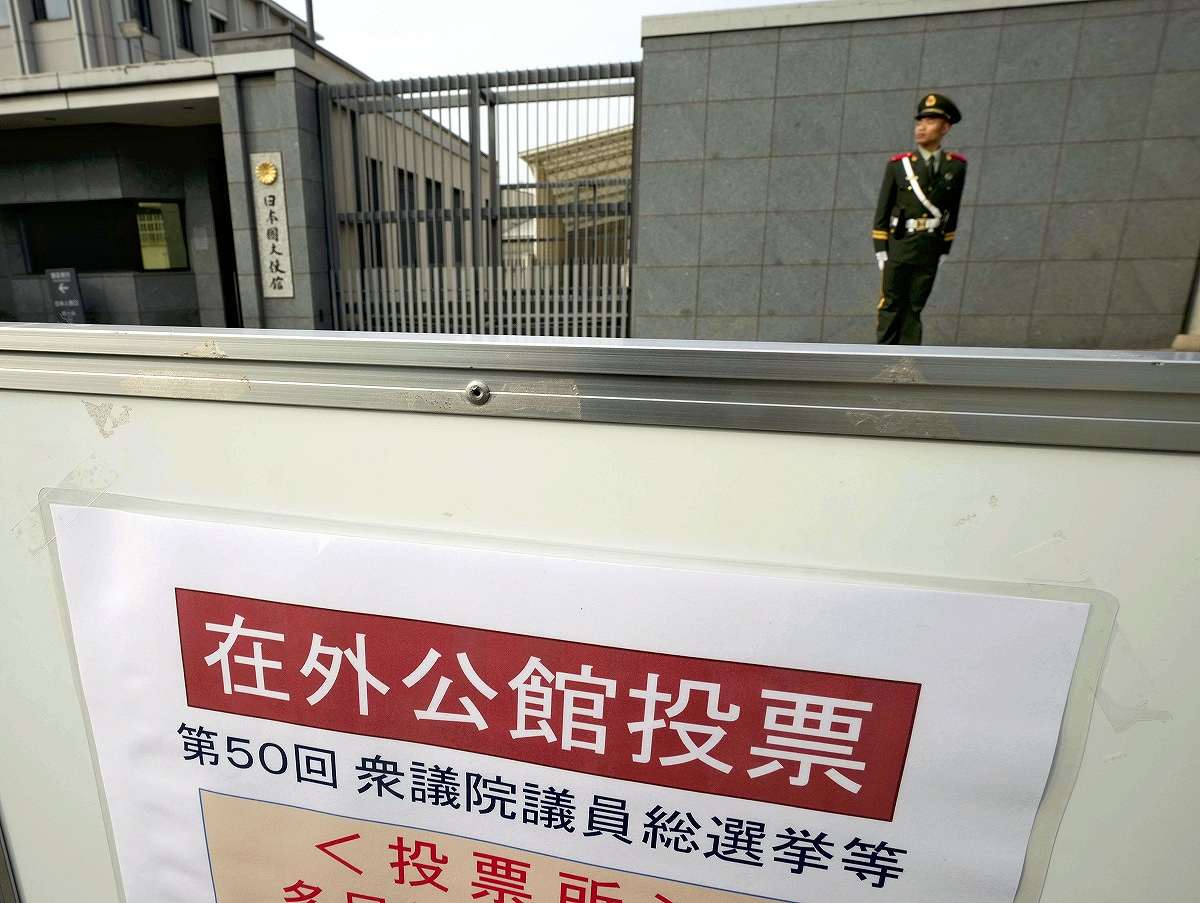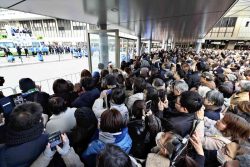Japanese Overseas Struggle to Cast Their Vote, Hamstrung by Scarce Polling Stations and Slow Mail

Overseas voting for the Oct. 27 lower house election started Wednesday at the Japanese Embassy in Beijing.
1:00 JST, October 19, 2024
Japanese voters living abroad have been finding it difficult to vote in national elections due to the small number of polling stations and the high financial cost.
While the government is trying to improve overseas voting, one expert argues that the government should work harder to expand voting opportunities for Japanese expatriates.
‘Fed up with overseas voting’
There are two ways for eligible Japanese voters living abroad to cast their votes — at diplomatic missions or by mail.
Hiroko Uchida, 49, has been living in the United States for about 20 years and works at a department store. Her closest polling station is the Japanese consulate general in Los Angeles, some 200 kilometers away from her home in San Diego. It takes two hours by car just to get there. If she wants to vote in a national election, she has to set aside a day just for this.
She is also allowed to vote by mail, and the Japanese municipality where she lived before coming to the United States will send her a ballot paper. However, her ballot arrived at her home just a week before election day in the previous House of Representatives election in 2021. It would have cost her about $60 (about ¥9,000) to send the ballot express so it would be delivered in three to five days. She chose to send it by regular mail but she is not sure whether it arrived in time or not.
“I wanted to vote for a party that is serious about addressing the issue of money in politics, but I am fed up with overseas voting,” she said. She has given up on voting in the upcoming lower house election on Oct. 27.
2% turnout
According to the Foreign Ministry, there were about 1.02 million eligible Japanese voters living abroad as of October 2023. Of those, around 20,000 voters have cast ballots in recent elections, which means the turnout rate among Japanese expatriates is just about 2%.
To make it easier to vote overseas, the government has since July allowed some procedures to register on the overseas voter roll to be conducted online. It used to take Japanese expatriates two or three months to complete the registration procedures, but now the period has been significantly shortened.
For this election, Yasuaki Namba, 40, a lawyer living in Manila, applied to register on Sept. 30 and his registration was completed in eight days. He went to the Japanese Embassy in Manila on Thursday and cast his vote. “I wanted to vote for a candidate who would help Japan grow. I am glad I was able to vote in the election,” he said, sounding pleased.
‘Consider online voting’
However, the methods for overseas voting have hardly been changed since it became possible to do so in 2000. According to Hiroyuki Takenaga, co-representative of the Japanese Overseas Voters Network New York, a group working to improve overseas voting, many Japanese expatriates have received their ballots after election day due to the global decline in postal services, among other reasons. Many Japanese voters living abroad cannot cast their ballots even if they want to.
“The government should consider such measures as printing ballots at diplomatic missions for Japanese expatriates and introducing online voting in order to ensure voting opportunities for as many Japanese expatriates as possible,” said Masahito Tadano, a professor specializing in the Constitution at Hitotsubashi University.
Overseas voting was introduced in the 2000 lower house election, but overseas Japanese voters were only allowed to vote in the proportional representation segment at that time. They have been allowed to vote in constituencies since the 2007 House of Councillors election. Since ballots cast at diplomatic missions are transported by Japanese officials by air to Japan, the voting period is limited, ranging from two to six days from the day after the start of official campaigning.
Top Articles in Politics
-

Japan PM Takaichi’s Cabinet Resigns en Masse
-

Sanae Takaichi Elected Prime Minister of Japan; Keeps All Cabinet Appointees from Previous Term
-

Japan’s Govt to Submit Road Map for Growth Strategy in March, PM Takaichi to Announce in Upcoming Policy Speech
-

LDP Wins Historic Landslide Victory
-

LDP Wins Landslide Victory, Secures Single-party Majority; Ruling Coalition with JIP Poised to Secure Over 300 seats (UPDATE 1)
JN ACCESS RANKING
-

Japan PM Takaichi’s Cabinet Resigns en Masse
-

Japan Institute to Use Domestic Commercial Optical Lattice Clock to Set Japan Standard Time
-

Israeli Ambassador to Japan Speaks about Japan’s Role in the Reconstruction of Gaza
-

Man Infected with Measles Reportedly Dined at Restaurant in Tokyo Station
-

Videos Plagiarized, Reposted with False Subtitles Claiming ‘Ryukyu Belongs to China’; Anti-China False Information Also Posted in Japan






















